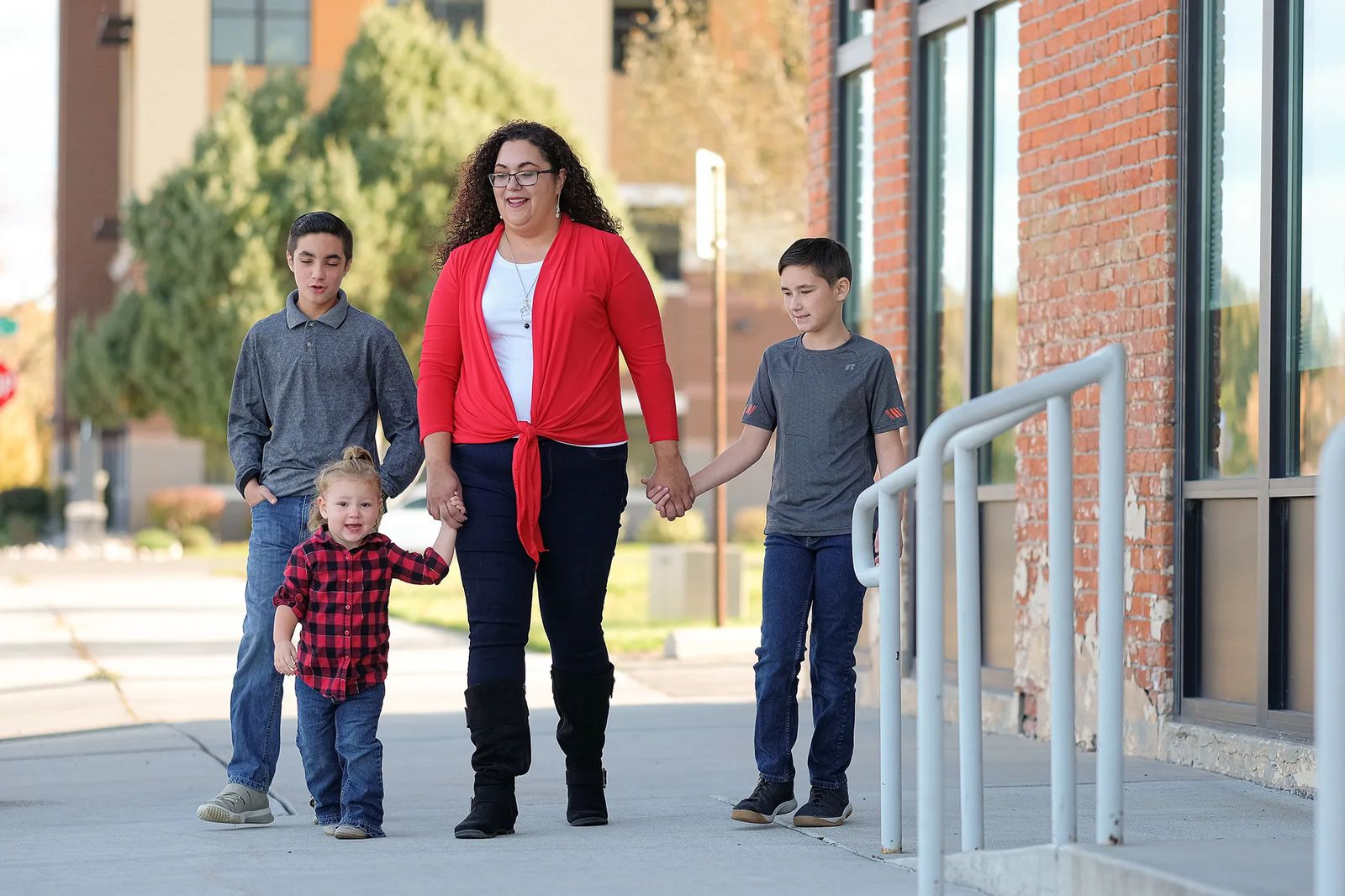
Finally Home
Felicia Burg overcomes homelessness to lend a hand to others facing the same struggles
Trudging across freshly fallen snow, 36-year-old Felicia Burg walks to a place that pulls her back to a dark spot in her past.
“No one could see you,” Felicia says as she points out the 3-by-3-foot landing perched on the backside of a church near the center of town. She says she probably spent more than 100 nights climbing up the narrow stairway to sleep. She chose the spot not only because it was shielded by the wind, but because it was across the alley from the drug house where she’d often score meth.
“It was as safe as I could get,” she says. Returning here, she says, feels surreal. “When you are in it, you can’t see a way out. You cry. You want to be anywhere but there.”
For Felicia, “there” was on and off the streets of Billings. She was first homeless at 17. She spent the next 13 years fighting against the things that kept her there.
“My mom dealt a lot with mental illness and depression,” Felicia says. “I remember really good days where my mom did a lot for us, and then I remember days where she couldn’t get out of bed and I took care of my brother and sister.”
When her mom and stepdad’s volatile relationship ended in divorce, her father came from New Jersey to pick up her little brother and sister. He left Felicia to care for her mom. The family home in Absarokee was sold to settle the divorce.
“At that point,” Felicia says, “my mom shut down. I dropped out of school and tried to help. That didn’t really work.”
Before long, Felicia made her way to Billings and would spend nights either sleeping in her car or couch surfing. That’s when the city’s dark side started to envelop her, she says.
“I met a guy who was a big drug dealer in town. Even my mom was scared of him,” Felicia says. “She told me, ‘Don’t mess with him,’ and so I moved in with him. He was 36 at the time.” It was the first of many bad choices to come. “I wanted my mom to step up and save me.” She adds, “It didn’t work. I just got progressively worse and worse.”
As she talks about couch surfing to keep a roof over her head, she shares how the stories about women being used in exchange for drugs are true.
“It was a survival mechanism because these were the people who would feed me and let me sleep there,” she says. “It was better than sleeping outside. I understand more now about sex trafficking. I was told, ‘If you want to live here, this is what you need to do. This is payment.’ It seemed logical at the time. Now you look back and think, what kind of grown man would do that?”
“It just felt at that point like everything was going to fall apart. I was going to lose my kids. But I couldn’t stop using. I would get stressed out and start using more. I didn’t know how to break that cycle.”
Before she hit 20, Felicia was dealing drugs. She got a job as the doorman at a strip club on the outskirts of town. By her early 20s, she was on the road with a traveling carnival. For the first time in a long time, she had a roof over her head, and it didn’t come with strings attached.
“I had a door I could lock and had somewhere to put my stuff,” Felicia says. “But, by that point, I was a full-blown addict. I had a $100-a-day habit. Meth was still my drug of choice.”
At 24, she found herself pregnant, still addicted to meth.
“I didn’t want to believe I was pregnant,” Felicia says. “I didn’t stop using. I traveled with the carnival until I was eight months pregnant.”
When her son Bryten was born healthy, she took root back in Billings. She and the baby’s father tried hard to make life work, never able to dig themselves out of poverty and addiction. Two years later, her son Eli was born.
“We were living in a camper with no bathroom, no running water, no electricity,” Felicia says. “We were trying to keep food, what we could, in coolers. We had a few of those glass coffee pots that the boys would use to go to the bathroom and then we would dump them outside.” When Bryten got into kindergarten, Felicia says the school picked up on the red flags and Child Protective Services was called in to investigate.
“It was obvious something was wrong. I was forgetting to pick him up from school. He was going to school in dirty clothes,” Felicia says. “It just felt at that point like everything was going to fall apart. I was going to lose my kids. But I couldn’t stop using. I would get stressed out and start using more. I didn’t know how to break that cycle.” The family constantly moved the camper all over town to avoid being found. Eventually CPS caught up with her. “The thought of losing my kids is what forced me and motivated me to do something different.”
After trying a number of outpatient programs, in 2013 Felicia and her two boys stood outside the offices of a Billings nonprofit now known as Family Promise of Yellowstone Valley. She’d left the boy’s father and had been clean for about nine months.
“I was scared to death,” Felicia says. “I had done other programs here in town and either it wasn’t the right time for me or it wasn’t the right program. I felt like a number a lot of the time.” When she walked into Family Promise, it was different. “I was not a number,” she says. “I was a person and I was loved. Once I finally got that, that’s what really changed my thinking.”
“She was a mess,” says Lisa Donnot, executive director of Family Promise. “She was a single mom with two kids, no transportation, no job and no place to live. But she wanted our program. I could tell that she knew it was time.”
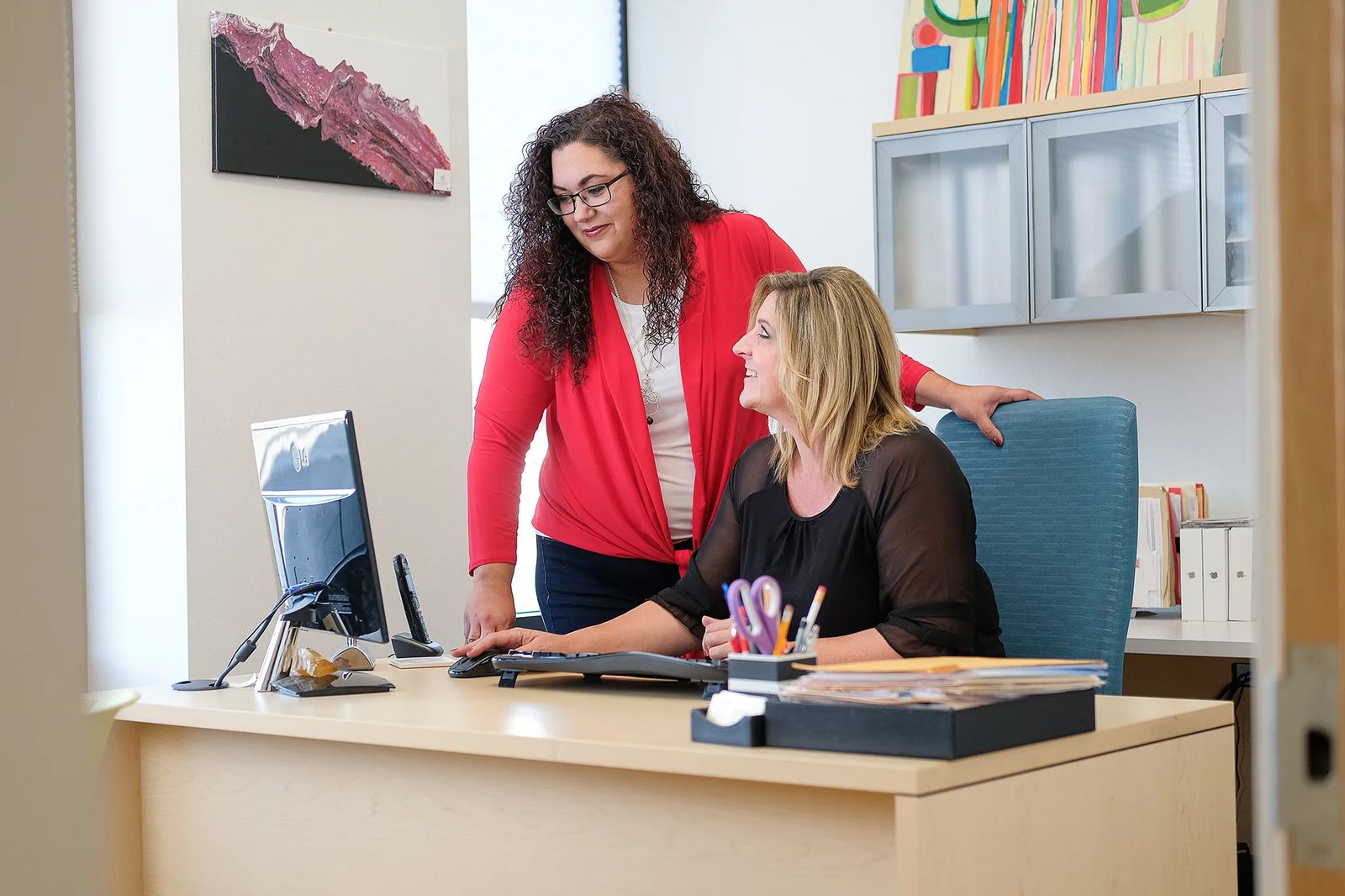
After being welcomed into the program, Felicia and her kids started counseling. She joined a faith-based 12-step program and started attending Harvest Church. She got a job at Burger King, eventually moving her way up to a management role.
Monica Kordonowy met Felicia not long after she walked through the doors of Harvest Church. She says she was immediately taken by her strength. The two became fast friends.
“I was able to listen to her story,” Monica says. “She was at a pretty low point in her life. I was shocked to hear that this is what she was going through because nothing gave me the impression that she was struggling like that.”
Each week, it seemed, Felicia and her boys stood on more stable ground. After spending four months in Family Promise’s emergency shelter, they moved into the program’s transitional apartments.
“I told Lisa, ‘I really want to be the first homeowner.’ They were just trying to figure out how to do homeownership through Family Promise,” Felicia says, “Then I told her, I want to work here. Lisa never told me ‘no.’ She just told me she needed a resume.” Through it all, Felicia says the encouragement she felt was something she hadn’t experienced in a long time.
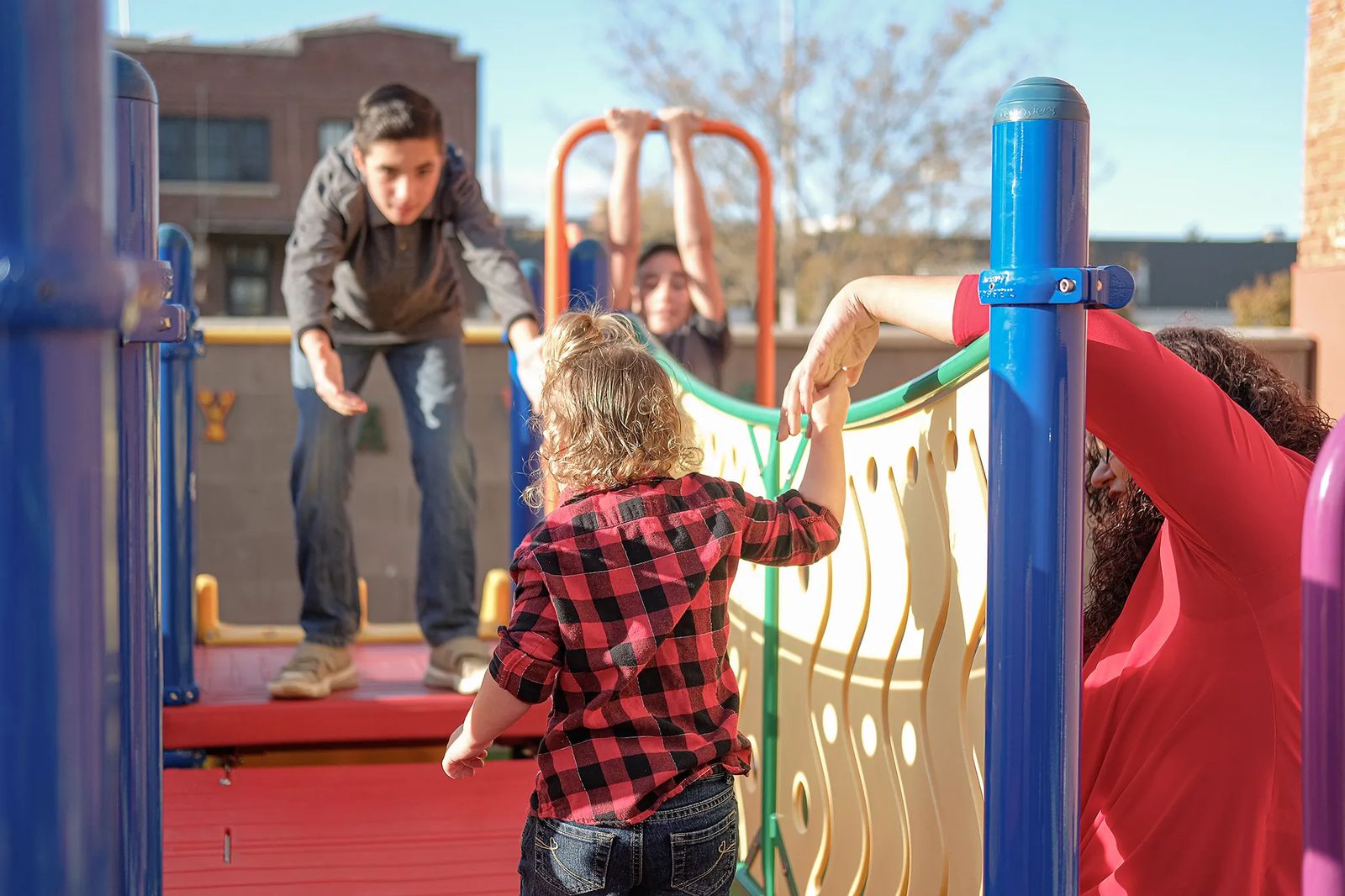
“She hadn’t had a lot of opportunity and she never really had anyone in her corner,” Lisa says. Once she began to trust, she adds, “We just broke everything down.” They pulled her credit report and worked on fixing it. “She would say, ‘You can’t fix that,’ and I would tell her, ‘Trust me, we can,’” Lisa says.
“It was the first time I was really pushed to evaluate my choices,” Felicia says. “It was the first time I felt like I could do anything.” That’s when she started to dream about a career of giving back.
“My heart was here,” Felicia says of Family Promise. “I knew there were people who needed help.” When an opening for a job with Family Promise was posted, Felicia applied. She didn’t care that it was a part-time job driving the Family Promise bus in the afternoon, transporting families from the day center to the emergency shelter. She got the job. “There’s nothing more rewarding than helping someone else succeed,” Felicia says.
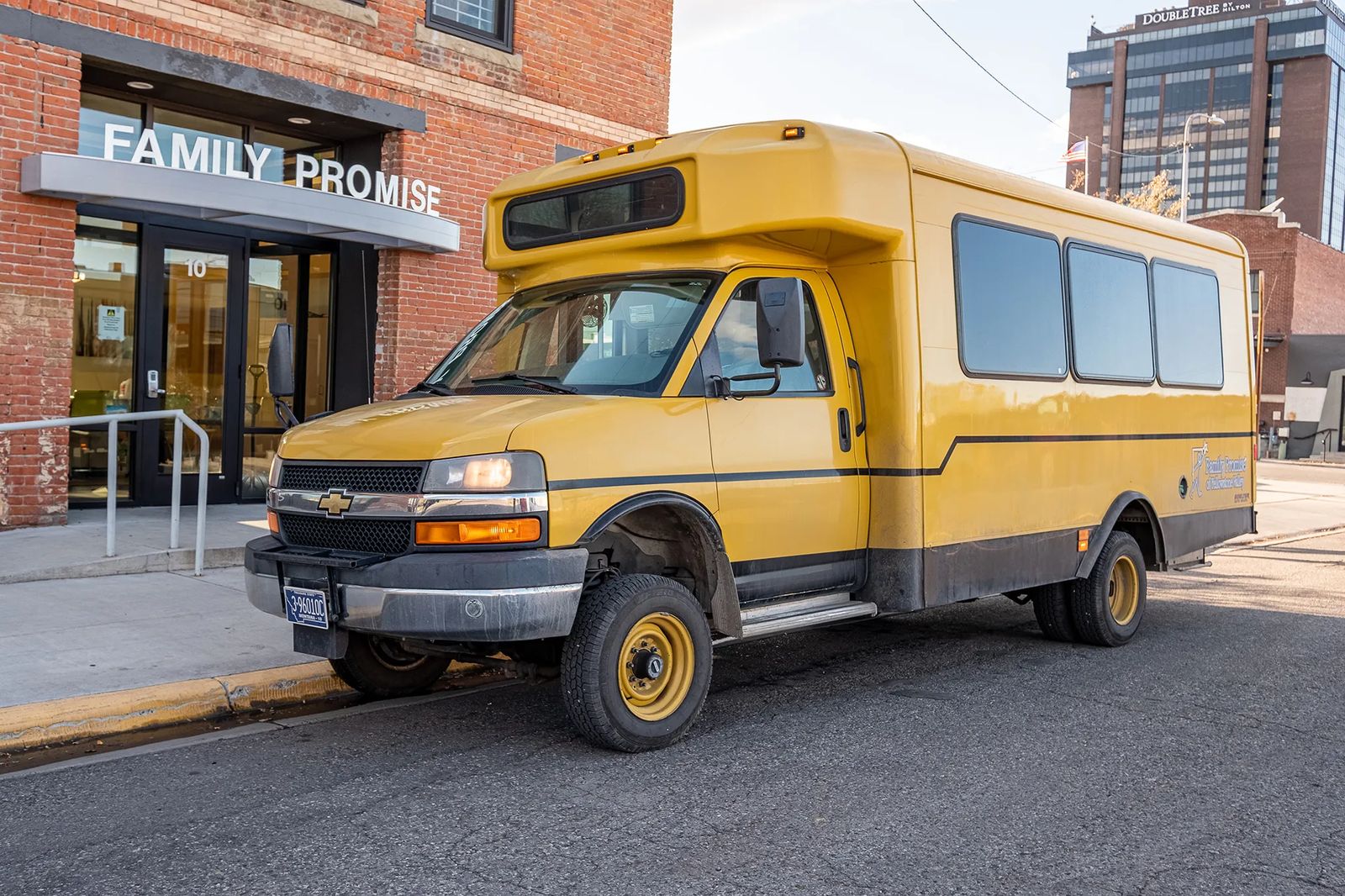
In 2016, when Family Promise was getting ready to move into its new building at 10 S. 26th St., Lisa Donnot called on Felicia again.
“Lisa said to me, I need somebody for a few more hours to help with this move, to get everything out of these file cabinets and onto these computers. I said, I can do that!” Felicia says she laughs when she thinks back to that moment. “I had no idea how to do any of that. I went home and Googled, ‘how to scan a document.’”
In three years, Felicia moved from being a part-time bus driver to a program assistant to marketing assistant, to development coordinator. She’s now in charge of Family Promise’s fundraising and public relations efforts. Lisa taught her the ins and outs of writing a grant, and Felicia has raised more than $300,000 this year alone through fundraising endeavors. She speaks in the community at least three times a week, hoping to spread awareness. She makes it a point to help teach Family Promise’s budgeting classes. And, she’s cheered families on who work hard to become homeowners.
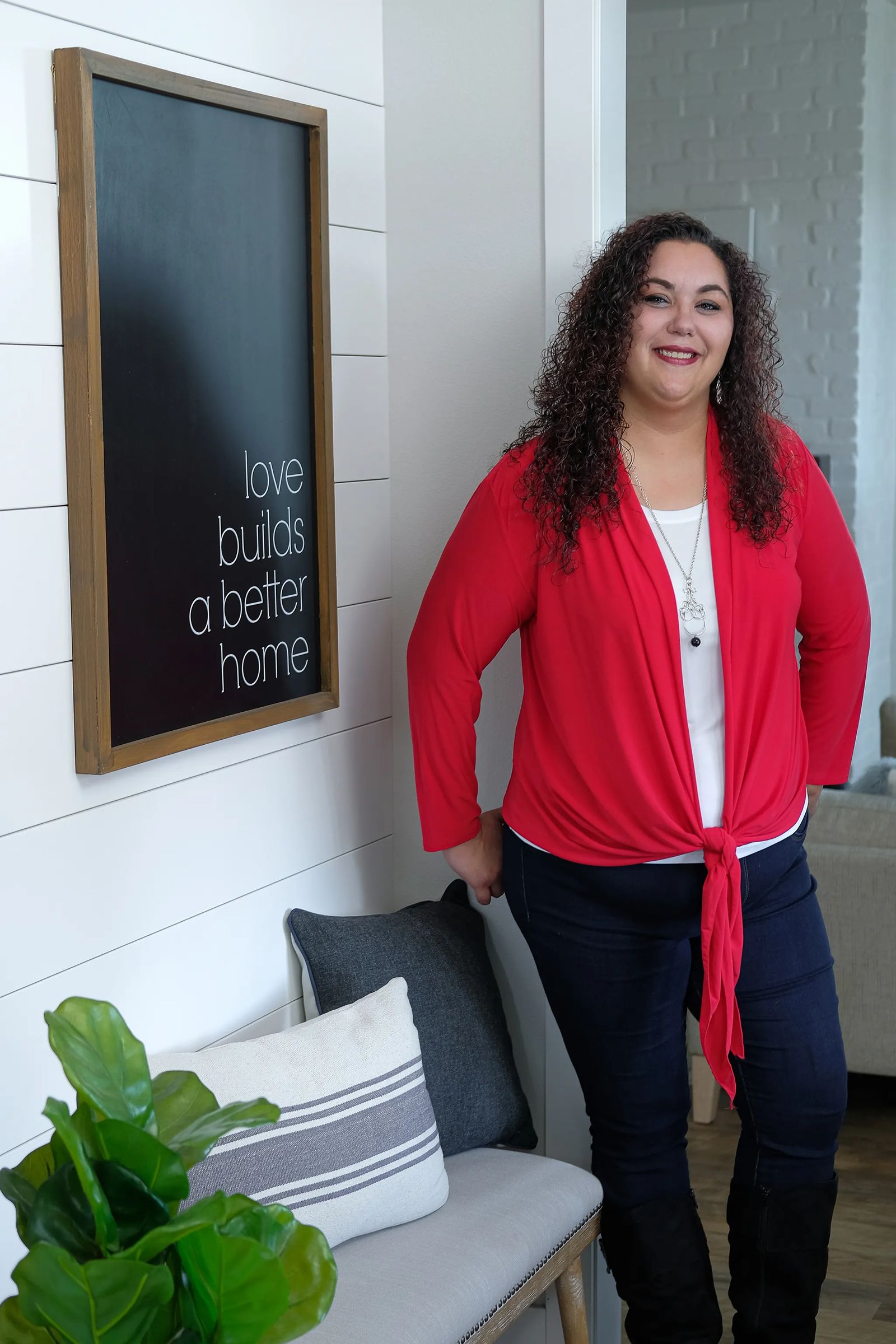
“We have had seven families in the last two years who have become homeowners through our program and it spreads to their family,” Felicia says of Family Promise’s Partners in Housing Program. “They finally see a glimpse of a way out.”
“She has really succeeded and has gone from barely getting her foot in the door to being in charge of fundraising and all of the events,” Monica says. “She motivates me just because of her drive. Not only is she helping people, but she can say, ‘I’ve been where you are at. You can push through this and you can make it.’”
One of Felicia’s latest missions has been to help low-income parents keep a steady supply of diapers for their babies. The bill for average-priced diapers for just one child can be more than $1,000 a year. For a parent who works a minimum wage job, that’s a big expense.
“About a year and a half ago, I had the idea of a mobile diaper bank,” Felicia says. She knew the statistics: 47 percent of the low-income families in our area have children under the age of 3. Family Promise had just gotten certified to be a part of the National Diaper Bank Network. “I thought, what if we took diapers to other places?” She started putting pen to paper to write a grant so Family Promise could buy a delivery truck to not only help those in Billings, but in rural areas as well.
“I started working on it and raising funds. I talked to pastors who were leading programs. I talked with the ladies at WIC (Women Infant and Children). They brought up all the problems that could crop up,” Felicia says. After working through all the potential pitfalls, Felicia secured a $10,000 grant from the giving circle known as 100 Strong. Hardin Chevrolet donated, as did the Billings Downtown Exchange Club. In the end, Family Promise was able to use the $26,000 raised to buy the vehicle and set up a small maintenance account to keep it running.
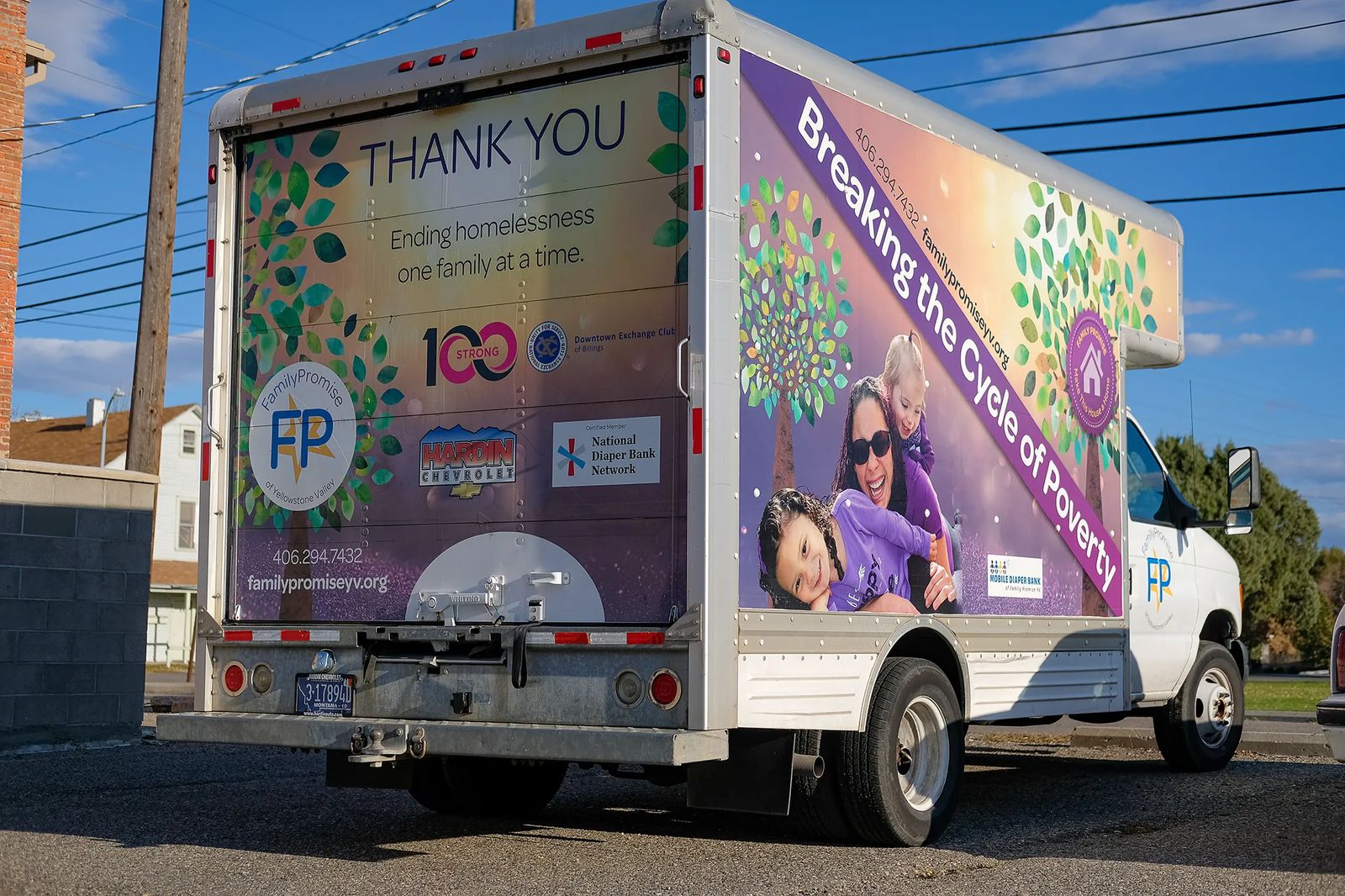
“I am super proud we are doing it. I love it,” Felicia says. In addition to serving the Billings community, the Mobile Diaper Bank hits the road and serves the food pantry in Pryor once a month. “I just had an idea and now it’s working.” Family Promise doles out roughly 7,000 diapers to those in need each month.
There are times when Family Promise outreach takes Felicia back to some of the very same places where she struggled to survive. Even today, she sees familiar faces.
“I was on the streets for almost 10 years here and, yes, I still see people that I know out there,” Felicia says. “I can only imagine how much more has happened in their lives during that time frame.” Not too long ago, she approached one of the women. “I told her, ‘You look like crap.’ She said, ‘I know. I know. I was supposed to get a bed day at Rimrock and I couldn’t get a ride.’” Felicia remembers digging into her pocket. “I told her, ‘When you are ready, here’s my card. I will always be here.’ Maybe it doesn’t sink in all the time but maybe she will pull my card out later.”
Felicia knows there’s a reason she’s lived the life she has.
“I just know that God has a purpose for my life because there are so many situations that I should never have walked out of and I did,” she says. “I have found a lot of power in my story and I know that God doesn’t waste a hurt. I may not be able to see here on this earth why all of this happened but I know I will be able to at some point.”
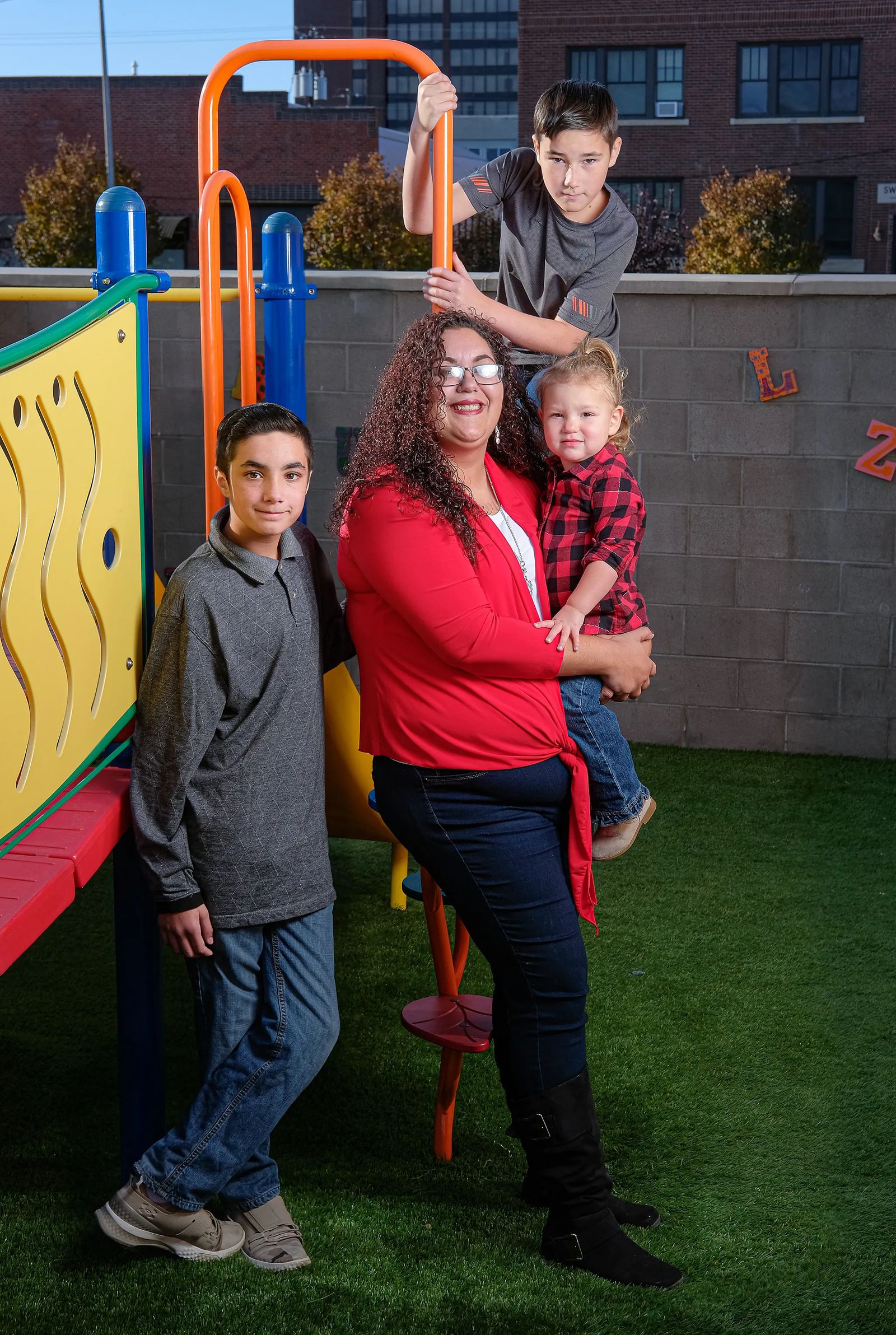
Her son Bryten is now 12. Eli is 10 and her youngest, Penelope, is 2. For the first time, she isn’t worried about their futures. Her sons already talk about going to college.
“There are still struggles,” Felicia says. “I just got a divorce last month. That was another bad choice that I made, but Lisa has told me for years, there is nothing that we can’t get through.”
While she’s happy in her role at Family Promise, it’s Felicia’s goal to one day be the executive director of Family Promise or a nonprofit like it. She often tells Lisa she needs at least five more years of mentoring. “I would love to see her become the executive director whenever I decide to move on,” Lisa says. “She loves serving this community to her core.”
She serves so others don’t follow in her footsteps and have to bear the scars of living life on the streets.
“I don’t think those scars ever really go away, but I know they made me who I am today,” she says. “Today, I am a powerful woman who wants to make a difference in the world.”
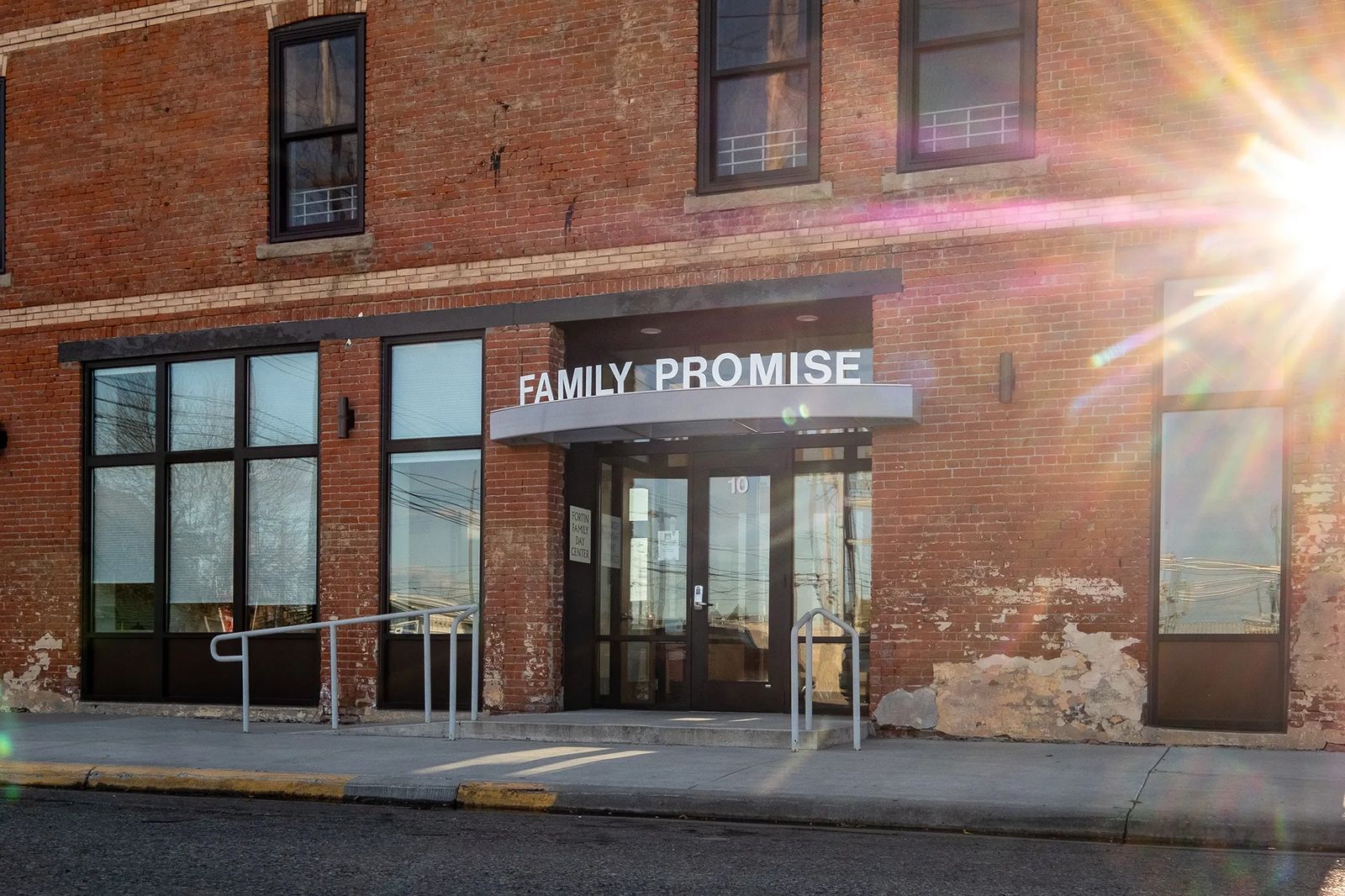
FAMILY PROMISE
A look at the organization at a glance
Family Promise helps families struggling with homelessness or extreme poverty to overcome the barriers that led to financial insecurity. Emergency shelters set up at one of 30 partnering congregations and served by more than 1,500 volunteers help provide temporary housing. At the same time, Family Promise provides life skills training to help families break the cycle of generational poverty. Ninety percent of the families served in the shelter and transitional housing program achieve secure housing and maintain it for a year or longer. In 2018, Family Promise served 515 families with its case management, emergency shelter, transitional housing, diaper bank and after-care programs.
HOW YOU CAN HELP
Because Family Promise is 100 percent supported by individual donations and grants, it is continually in need of not only financial help but material items as well. In addition to these basic needs below, Family Promise is always looking for help with Christmas presents for the families they serve in both emergency and transitional housing. For more, visit familypromiseyv.org or call the organization at (406) 294-7432.
Size 5 and Size 6 diapers
Toilet paper
Paper Towels
Laundry soap
Dryer sheets
Shampoo/conditioner
Razors
Baby wash
Tooth paste/brushes
Deodorant
Chapstick









